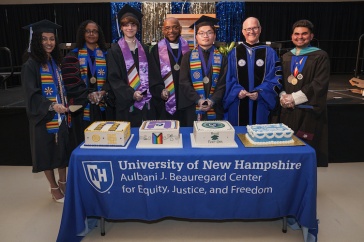
UNH became one of only two universities in the country to have all of its dining halls achieve a four-star rating from the Green Restaurant Association (GRA) following a recertification process this year, as both Holloway Commons and Philbrook Dining Hall earned the organization’s highest ranking available.
Each had previously held a three-star rating but for the first time cleared the 300-point requirement necessary to attain four stars under the GRA evaluation, which focuses on environmental sustainability in a number of categories. UNH Catering and the Dairy Bar each earned three-star status, as well.
Holloway Commons and Philbrook Hall are the only four-star certified GRA restaurants in the state of New Hampshire.

from within a 100-mile radius of campus.
“Sustainability at UNH is a shared ethos that knits our community together in everything that we do. UNH Hospitality has been a bright spot in our sustainability work for the last 25 years and this four-star recognition is so well deserved,” says Tom Kelly, chief sustainability officer and executive director of the UNH Sustainability Institute. “While many campuses rely on large corporate food companies to run their dining operations, UNH runs its own operation with an incredible team that works tirelessly, often behind the scenes, so it’s great to see them recognized like this. Their effort not only provides healthy, delicious, sustainable local food to the entire UNH community, but also supports local farmers and fishers and food businesses and contributes to our top tier national ranking in sustainability.”
Restaurants are evaluated by the GRA on their sustainable practices in energy, water, waste, reusables and disposables, chemicals and pollution, food, building and furnishings and education and transparency. Philbrook earned a score of 343.49, with Holloway Commons earning 324.73.
The Dairy Bar and Catering earned scores of 224.27 and 214.86, respectively, comfortably clearing the 175-point threshold necessary for a three-star rating.
There were several key areas of focus that helped all of the UNH locations earn their high ranking from the GRA – none of them uses any polystyrene foam products, all have a comprehensive recycling program and all take steps to reduce energy and water usage.
“This achievement signifies our efforts to provide the best sustainable practices and insights – from energy use, waste management, sustainable and local food sourcing, sustainable durable goods and building material, oil recycling and more,” says Maureen Carter, general manager of Philbrook. “And through this program we have proven that we and our campus community can be proud knowing that we are all part of reducing our carbon footprint.”
Carter noted that UNH’s annual local harvest dinner sources everything from within a 100-mile radius of campus and that Dining Services works with dietetic interns to highlight food waste awareness and showcase its composting program, which composts more than 200,000 pounds of food annually.
More than 3,000 pounds of food are sourced annually from the farms at UNH, and in the past few years Philbrook has started a microgreen growing program to highlight nutritional usage while partnering with the university’s Farm to UNH program, where students learn about growing, harvesting, storing and preparing vegetables.
Heather Lascelle, general manager of Holloway Commons, pointed to the composting program partnership with UNH’s Kingman Farm, through which student plate waste is pulped into compost and delivered to the farm to support UNH crops – which, in turn, creates fresh produce from the farms for use in the dining halls. Food waste from Philbrook, Holloway Commons and the Memorial Union Building (MUB), as well as select residence halls and apartments, is transported to Kingman Farm.
She also touted the reusable take-out program, which doesn’t utilize disposables.
“All of these ‘little’ big things add up in the grand scheme of things to promote sustainability,” Lascelle says. “This recognition speaks volumes regarding our sustainability commitment, to not only serve nutritious and highly acceptable menu variety to our students, but to be a national leader in a comprehensive, sustainable dining program. It really shows how environmentally responsible we are, and our commitment to the future of our students, community and planet.”
-
Written By:
Keith Testa | UNH Marketing | keith.testa@unh.edu
















































